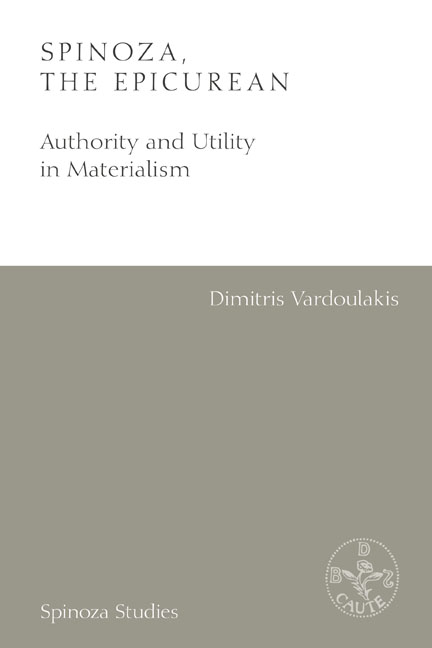Book contents
- Frontmatter
- Contents
- Reference Guide to Spinoza’s Work
- Acknowledgements
- Dedication
- Preamble
- Introduction: Why is Spinoza an Epicurean?
- 1 Freedom as Overcoming the Fear of Death: The Dialectic of Authority and Utility in the Preface
- 2 The Power of Error: Moses, the Prophets and the People (chapters 1, 2 and 3)
- 3 Philonomianism: Law and the Origin of Finitude (chapter 4)
- 4 Political Monism: The Primacy of Utility over Authority (chapters 5 and 6)
- 5 Love your Friend as Yourself: The Neighbour and the Politics of Biblical Hermeneutics (chapters 7 to 13)
- 6 The Freedom to Philosophize: The Two Paths to Virtue (chapters 14 and 15)
- 7 Fear and Power: Natural Right and Authorization in Spinoza and Hobbes (chapter 16)
- 8 Theocracy: On the State of Authority (chapters 17 and 18)
- 9 The Authority to Abrogate: The Two Paths to Virtue and the Internal Enemy (chapters 19 and 20)
- Conclusion: The Limitation of Spinoza’s Epicureanism
- Bibliography
- Index
Preamble
Published online by Cambridge University Press: 20 October 2020
- Frontmatter
- Contents
- Reference Guide to Spinoza’s Work
- Acknowledgements
- Dedication
- Preamble
- Introduction: Why is Spinoza an Epicurean?
- 1 Freedom as Overcoming the Fear of Death: The Dialectic of Authority and Utility in the Preface
- 2 The Power of Error: Moses, the Prophets and the People (chapters 1, 2 and 3)
- 3 Philonomianism: Law and the Origin of Finitude (chapter 4)
- 4 Political Monism: The Primacy of Utility over Authority (chapters 5 and 6)
- 5 Love your Friend as Yourself: The Neighbour and the Politics of Biblical Hermeneutics (chapters 7 to 13)
- 6 The Freedom to Philosophize: The Two Paths to Virtue (chapters 14 and 15)
- 7 Fear and Power: Natural Right and Authorization in Spinoza and Hobbes (chapter 16)
- 8 Theocracy: On the State of Authority (chapters 17 and 18)
- 9 The Authority to Abrogate: The Two Paths to Virtue and the Internal Enemy (chapters 19 and 20)
- Conclusion: The Limitation of Spinoza’s Epicureanism
- Bibliography
- Index
Summary
Why Does it Matter to Read Spinoza as an Epicurean?
Reading Spinoza's Theological Political Treatise as symptomatic of his epicureanism offers both a radical reconsideration of his work and suggests why he is still relevant to our contemporary political predicament. This double gesture – an historicization of Spinoza's argument so as to highlight his political relevance – is not uncommon. For instance, Gilles Deleuze in Expressionism in Philosophy reads Spinoza's materialism as a reversal of Platonism that leads to what he calls ‘the plane of immanence’, the basis of his own political philosophy. Or, Antonio Negri in The Savage Anomaly repositions Spinoza in a materialist tradition that privileges the idea of constituent power as a political force that is the linchpin of later writings such as Empire.
This historicized repositioning of Spinoza is in a certain sense prompted by the lack of work on the history of materialism. As Negri observes in a note to his Savage Anomaly, ‘materialism has not been historicized!’ There are historical accounts of Platonism, Aristotelianism and Stoicism. There are historical accounts of medieval schools of philosophy such as nominalism. And there are historical accounts of all major schools of modern philosophy – the social contract tradition, idealism, Hegelianism, phenomenology and so on. But there is no authoritative account of materialism from antiquity to the present, with the exception of Friedrich Lange's book from 1864, which is both outdated and inaccessible today.
This lack is both a hindrance and an advantage when writing on Spinoza. It is a hindrance in the sense that, to define the precise sense in which Spinoza is a materialist, we are forced to historicize our reading of Spinoza. As Lange establishes, the core idea of every form of materialism is the rejection of creation out of nothing, or the rejection of transcendence. But this can be understood in many different ways that lead to divergent positions. So scholars writing on Spinoza need to historicize their approach to determine the exact sense in which he is a materialist.
This can also be advantageous because it allows Spinoza's readers to position their reinterpretation of his materialism in such a way as to resonate with contemporary political issues. Materialism has always had an uncanny propensity to resonate with current political concerns.
- Type
- Chapter
- Information
- Spinoza, the EpicureanAuthority and Utility in Materialism, pp. 1 - 9Publisher: Edinburgh University PressPrint publication year: 2020



